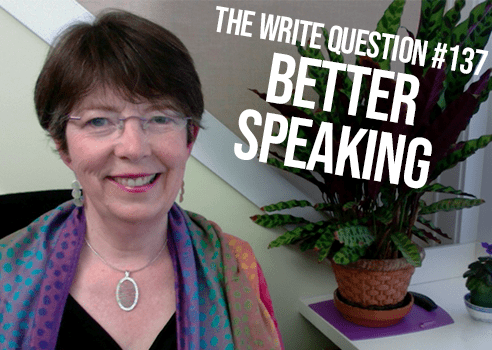Viewing time: 4 mins. 29 secs.
The Write Question is a weekly video podcast about writing that I started in 2017 and that ran, more or less weekly, until April 2022. This is a republication of issue #137, which discusses how to get better at speaking. The post first ran on April 24/20.
Transcript:
How do you get better at speaking? That’s the topic I’m addressing today in The Write Question. I’m Daphne Gray-Grant, the Publication Coach, still in pandemic mode.
I have a question from Darek Stiller, a personal trainer based in Vancouver. Here’s what he’s asked by email…
“You have a lot of ideas about how to stay in what’s called the ‘diffuse’ state while writing. For example, you suggest using mindmapping and covering our monitors when we write. I wonder if there’s any corollary for speech? I’ve always felt like I can’t achieve flow in certain conversations. Over the years, I’ve had the thought that I might be overly filtering myself. And I wonder if this could arise from me favouring my editing brain, which appears to be the dominant one for me.”
Thanks for your fascinating question, Darek! Although my expertise lies in writing, I’m also trained in speaking and I’ve been a volunteer high school debate coach for many years.
The act of debating calls upon a number of special skills. You need to be smart and analytical. You need a calm, confident manner. Perhaps, most surprising, you need to be a really good listener.
I find unless students have all three of these characteristics, it’s hard for them to become really adept debaters.
Darek, I know you probably think you’re not speaking quickly enough, but recognize that “flow” doesn’t mean fast like a river. It means you’re able to respond in an honest and forthright way to what the other person is saying.
We ALL have different speaking styles. Consider, for example, the rapid fire and amusing style of Stephen Fry, an English actor, writer and comedian. Then compare him to former US president Barak Obama, whose speaking style is much slower and more measured and even a little ponderous. I’ve included video links to both in the show notes.
But despite their different styles, both men are known to be highly effective speakers. If someone told Obama to speed up, he’d tell them to take a hike.
Darek, I think what you need is to understand that ‘flow’ in speaking doesn’t come from the creative brain vs the linear logical one. Instead, it comes from two strategies:
- Understanding your own natural style and embracing it. Whether that’s fast or slow, loud or soft, clever or empathetic.
- Really LISTENING to what the other person is saying to you.
To follow both strategies, you need practice. I highly recommend the group Toastmasters. It has more than 16,000 clubs in 143 countries and its membership is greater than 358,000. Membership is incredibly inexpensive — usually less than $50 a year — but you can always attend initial meetings for free. Link below. I’ve visited several Toastmasters groups myself and I’ve found both of them to be wildly accepting and supportive.
Like every other business and organization in the world, Toastmasters has been affected by the pandemic but check their website and see if some groups have digital opportunities if you want to get started right away. Below, I include a link to a blog post I wrote about my own Toastmasters visits.
Finally, let me wrap up with a quote from the noted speaker and former British Prime Minister Sir Winston Churchill: “If you have an important point to make, don’t try to be subtle or clever. Use a pile driver. Hit the point once. Then come back and hit it again. Then hit it a third time – a tremendous whack.”
Darek, I know you’re a personal trainer, so let me make an analogy between exercise and speaking. If you want six-pack abs, you don’t get them by reading about how to be more physically fit. You get them with exercise. Similarly, if you want to be a better speaker, you’ll achieve that goal with lots of speaking practise. Let Toastmasters give you a hand.
*
If you’d like to learn more about how to make writing a happier and more rewarding process, check out my latest book Your Happy First Draft. I don’t sell it in bookstores or via Amazon. The only place to buy it is on my website, link on the screen below and in the show notes.


